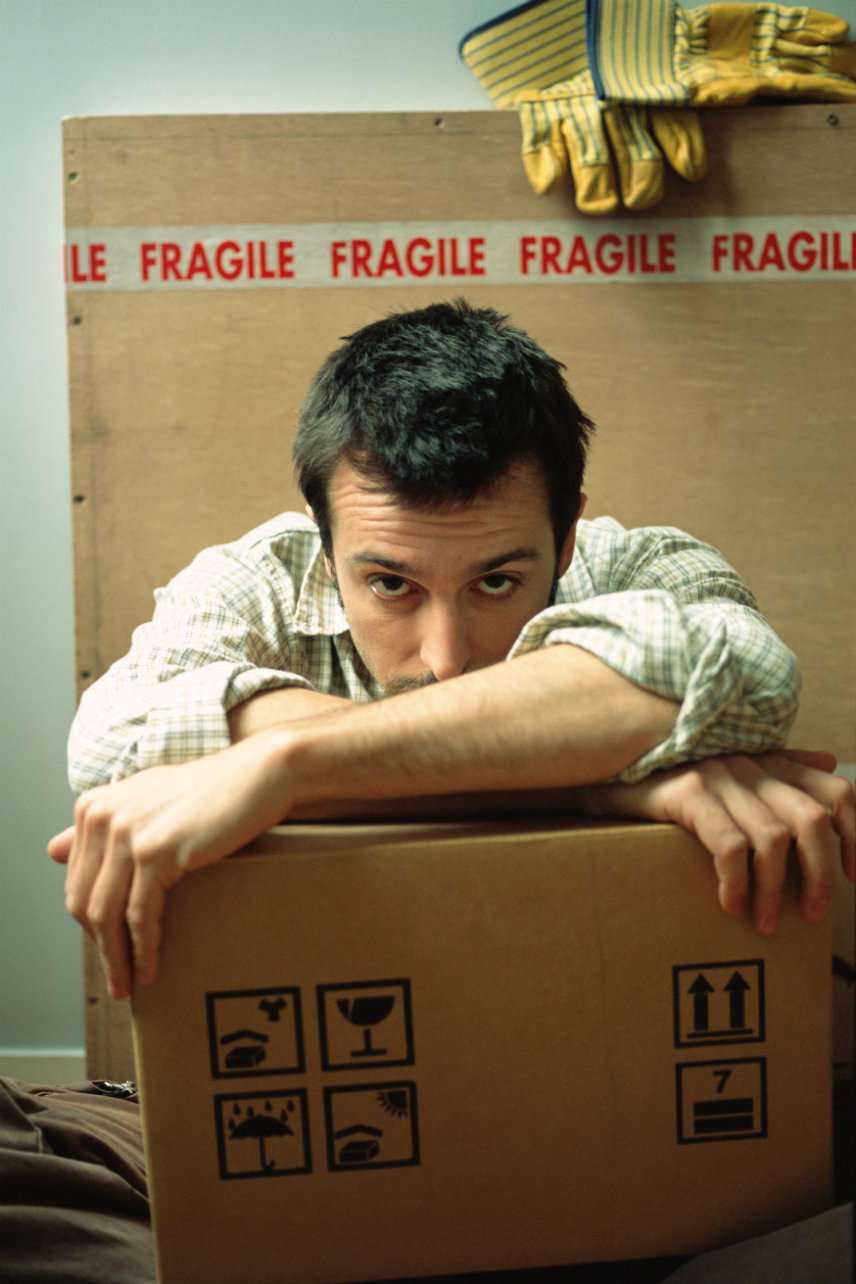New Jersey's Attacks on Unlicensed Movers Hurt Entrepreneurs and Consumers
Once again, government would best serve the public by just getting out of the way.


When New Jersey officials busted unlicensed movers in 2015, they trumpeted their efforts against businesses "who were allegedly targeting Asian and Latino communities in New Jersey." Last week, they announced the results of their sting against unlicensed enterprises that sought to provide moving services to "an upscale neighborhood in Montville." Garden State apparatchiks went from pretending they're protecting people "largely unaware that these unlicensed companies are in violation of the law and are avoiding requirements designed to protect consumers from fraud and deceit" to shielding wealthy people from cutting deals with the businesses of their choice.
In neither case was anybody being protected—except for politicians' buddies, being sheltered from competition. The evidence continues to show that occupational licensing hurts opportunity and hikes prices without enhancing safety.
There's wide agreement that licensing laws make it hard for people to start businesses, enter trades, and move from place to place in search of work. Such burdens fall especially hard on those with fewer resources to begin with.
"States that license more than 50 percent of the low-income occupations had an average entrepreneurship rate that was 11 percent lower than the average for all states," a much-cited Goldwater Institute report noted in 2015. "The higher the rate of licensure of low-income occupations, the lower the rate of low-income entrepreneurship."
Democrats and Republicans alike find this argument and the data behind it compelling. They note that licensing poses barriers to entry that limit access to many trades. This cuts off economic opportunity for the poor, and also limits choice for buyers of goods and services.
"[B]y imposing requirements on people seeking to enter licensed professions—such as additional training and education, fees, exams, and paperwork—licensing reduces employment in the licensed occupation and hence competition, driving up the price of goods and services for consumers," the Obama administration acknowledged in a 2015 report.
The Trump administration agrees.
"Excessive licensing raises the cost of entry, often prohibitively, for many careers, barring many Americans from good, family-sustaining jobs," U.S. Secretary of Labor Alexander Acosta warned earlier this year while announcing a federal program intended to streamline state-level licensing requirements and make it easier to move across borders without jumping through repetitive sets of expensive bureaucratic hoops.
Hoops like those posed by the New Jersey Division of Consumer Affairs.
"You must carry a copy of your license on each moving truck and display one in each office," the eight-page New Jersey Public Movers and Warehousemen License Application demands (PDF). "The applicable fee is $400 plus $35 for each license. e.g. ABC Moving Company has office, one registered warehouse and 5 trucks. ABC's annual fee is $400 + 6 x $35 ($210)."
The Garden State also demands hefty insurance coverage—an extra expense not necessarily within reach of an entrepreneur with assets limited to little more than a strong back and a van.
Applicants must provide their citizenship status, ensuring that a fair smattering of members of the "Asian and Latino communities" supposedly fretted over by state officials may not qualify to legally engage in the moving business.
The application goes on to note that "your license will be denied" if you are behind on student loans or child support payments. Apparently, offering to move people from one home to another in return for monetary payment is an unacceptable means of catching up with such financial obligations.
In their breathless press releases about catching unlicensed movers in the act of loading washing machines and sofas onto trucks, New Jersey officials always insist that they are "protecting consumers against fraud and other risks."
But they're not.
"Most research does not find that licensing improves quality or public health and safety," the 2015 Obama administration report noted after surveying years of research. "Stricter licensing was associated with quality improvements in only 2 out of the 12 studies reviewed."
Licensing can fail to improve health and safety even in sophisticated fields like medicine.
"More stringent occupational licensing of dentists does not lead to improved measured dental outcomes of patients, but is associated with higher prices of certain services, likely because there are fewer dentists," concluded a study published in 2000.
"Optician licensing increases optician earnings with no measurable benefit to consumers," another study revealed just three years ago.
And New Jersey officials want us to believe that their licensing laws and multi-agency stings (yes, really) protect consumers who hire strong people to lift and carry stuff?
For a clue as to why New Jersey is really so insistent on licensing movers, notice the phrases that keep recurring in research on licensing laws: "driving up the price of goods and services for consumers," "higher prices of certain services," "increases optician earnings"…
Licensing is a great racket for those who are already ensconced in an industry and want to get keep competitors out and prices high. And New Jersey's governments has a long history of implementing laws to protect established and well-connected businesses from innovation and competition. Just look at how it became one of only two states with bans on self-serve gas after an entrepreneur named Irving Reingold tried to shake things up in the 1940s.
"The other gas station operators didn't like the competition. Someone tried shooting up Reingold's station. But he installed bulletproof glass, so the retailers looked for a softer target—the Statehouse," Star-Ledger columnist Paul Mulshine reported. "The Gasoline Retailers Association prevailed upon its pals in the Legislature to push through a bill banning self-serve gas. The pretext was safety, but the Hackensack fire chief had already told all who would listen that Reingold's operation was perfectly safe."
Then, as now, government officials pretended to protect the public while actually helping their buddies and harming entrepreneurs and consumers. Then, as now, the government would best serve the public by just getting out of the way.
Editor's Note: As of February 29, 2024, commenting privileges on reason.com posts are limited to Reason Plus subscribers. Past commenters are grandfathered in for a temporary period. Subscribe here to preserve your ability to comment. Your Reason Plus subscription also gives you an ad-free version of reason.com, along with full access to the digital edition and archives of Reason magazine. We request that comments be civil and on-topic. We do not moderate or assume any responsibility for comments, which are owned by the readers who post them. Comments do not represent the views of reason.com or Reason Foundation. We reserve the right to delete any comment and ban commenters for any reason at any time. Comments may only be edited within 5 minutes of posting. Report abuses.
Please to post comments


This is how I came to hate government. I kept seeing that more and more problems in society were caused by government, usually as a means (ha ha) of fixing prior problems caused by government. It started with the Vietnam War and NASA's bungled Space Shuttle, but I think the turning point was researching the Panic of 1907 which led to the income tax and the Fed, and was in turn caused by government bungling going back to the Civil War and before.
And then I started wondering why, and sort of invented self-ownership theory on my own, then discovered Economics in One Lesson, Rothbard, Bastiat, and a whole slew of others, and realized I had not invented any of the theory, but it was all so simple and obvious once you started thinking about it.
Fuck off, statists. Just go away. There is nothing your fevered dreams can do for me or anyone except cronies.
*hearty applause*
*adds to applause, requests encore*
Word. +1 "Breaking your leg and then handing you a crutch"
Heh. Posted just before the article listing NJ as one of the least free states.
Not necessarily a coincidence.
I had to do four years of training to learn to lift with my knees, and everyone else should have to do it to.
I usually lift things with my hands. Have I been doing wrong all these years?
Best idea (because it is mine).
Require all political candidates to obtain a license, for public safety. The license must be personally signed by 2/3 of the registered voters in the appropriate political arena. Anyone attempting to run for office without the license must work the rest of their lives holding a place in line at a DMV for no more than $5.00 per wait.
Problem: Unless there's a means for direct ballot proposals a'la CA, there's no way the politicians are ever going to subject themselves to this schema.
My experience has been that politicians pass regulations so that the bureaucrats will have a job and pay (pretty high pay) which they can use to help the politicians get reelected. But these regulation, for the most part, are not designed to help the average John Q Public. Any aid or help that John Q Public gets is either coincidental or even accidental.
TIL: In NJ, it's illegal to put boxes into a truck without a license.
Where's Tony to defend this public good?
What will future graduates of the Kennedy School of Big Government do if not regulating?
Ah, New Jersey, one of the few places I can look down on as someone who lives in the People's Republic of Massachusetts!
We just called it "furniture juggling". Sometimes there was no cash involved, although there was always some sort of bartering. Would you work all day for a practically new refrigerator? As in most unregulated (otherwise called "free") trade, it depends. Government doesn't have a category for that.
I once hired a home inspector to do a pre-purchase inspection. He was such a klutz that he didn't even notice that the bathtub's hot water was on the right (i.e., the opposite of standard), so I had to hire a handyman to fix that. I demanded that the inspector give me a partial refund to pay for this job (fortunately the cost of remediation was less than the cost of the inspection). He didn't seem to answer the phone after a while. However, when I filed a complaint with the state board of home inspectors, you can bet your sweet bippy that I got my refund!